|
|
|
Sort Order |
|
|
|
Items / Page
|
|
|
|
|
|
|
| Srl | Item |
| 1 |
ID:
108358
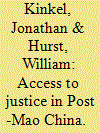

|
|
|
|
|
| Publication |
2011.
|
| Summary/Abstract |
Since the upheaval of the Cultural Revolution decade (1966-1976), post-Mao China has witnessed a sustained period of unprecedented legal reform. Criminal prosecutions and citizen lawsuits against the government, because they pit individual litigants against the authoritarian Chinese state, are two politically significant areas of law. We examine and critically assess the sociolegal scholarship on criminal and administrative legal reform as it has developed over the past few decades, with special attention to shifts in the conventional wisdom regarding legal reform and political liberalism in China and elsewhere. Additionally, we offer both theoretical and empirical suggestions for enhancing the explanatory power of sociolegal research in China.
|
|
|
|
|
|
|
|
|
|
|
|
|
|
|
|
| 2 |
ID:
192960
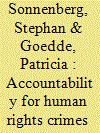

|
|
|
|
|
| Summary/Abstract |
This article explores how claims alleging serious human rights violations or breaches of international criminal law that occurred in the Democratic People's Republic of Korea (DPRK or North Korea) might unfold in the courts of the Republic of Korea (ROK or South Korea) under various differing jurisdictional theories. South Korea has legislation allowing for the exercise of universal jurisdiction, an increasingly widespread judicial mechanism for a national court to hold alleged perpetrators of serious human rights and humanitarian law violations accountable for their actions regardless of where the crime was committed and regardless of the victim's or the perpetrator's nationality. In South Korea, domestic criminal and civil jurisdiction can conceivably be "stretched" to encompass crimes perpetrated on the northern half of the Korean peninsula due to a constitutional provision that denies the existence of a separate North Korean sovereign nation. This article introduces and compares the feasibility and challenges of various jurisdictional approaches in South Korea that could address human rights crimes in North Korea, specifically (a) universal jurisdiction prosecution based on domestic law, (b) domestic criminal prosecution, and (c) civil cases in tort.
|
|
|
|
|
|
|
|
|
|
|
|
|
|
|
|
| 3 |
ID:
132774
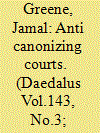

|
|
|
|
|
| Publication |
2014.
|
| Summary/Abstract |
Within U.S. constitutional culture, courts stand curiously apart from the society in which they sit. Among the many purposes this process of alienation serves is to "neutralize" the cognitive dissonance produced by Americans' current self-conception and the role our forebears' social and political culture played in producing historic injustice. The legal culture establishes such dissonance in part by structuring American constitutional argument around anticanonical cases: most especially "Dred Scott v. Sandford," "Plessy v. Ferguson," and "Lochner v. New York." The widely held view that these decisions were "wrong the day they were decided" emphasizes the role of independent courts in producing them and diminishes the roles of culture in creating them and of social movements in overcoming them. This essay argues for approaching these decisions as ordinary products of political culture rather than extraordinary products of judicial malfeasance. Doing so honors those who struggled for progress and may invigorate our political imagination in the present.
|
|
|
|
|
|
|
|
|
|
|
|
|
|
|
|
| 4 |
ID:
114762


|
|
|
|
|
| Publication |
2012.
|
| Summary/Abstract |
In this article, the authors will consider a very narrow yet spectacularly important aspect of the rule of law: its place in a constitution-the constitution of the United Kingdom-in which supremacy rests not with the constitution as a document to be interpreted by a constitutional court, but with the legislature itself. While traditionally the supremacy of the Crown in Parliament has meant that British courts have had no right to set aside even the most oppressive legislation, recent extra-judicial writings and obiter dicta in case law have been indicative of a shift in the judicial mood. In light of these developments, the paper will ask: Where does the relationship between the supremacy of the Crown in Parliament and the rule of law stand now? Where might that trajectory take us? And what might be done to reconcile the two?
|
|
|
|
|
|
|
|
|
|
|
|
|
|
|
|
| 5 |
ID:
100326
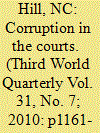

|
|
|
|
|
| Publication |
2010.
|
| Summary/Abstract |
The exponential growth in the size of the private security sector (PSS) in Africa has helped give the issue of its regulation new importance. Yet the ongoing debates over what laws should be passed and by whom tend to ignore the more basic and arguably urgent question of whether African states' justice systems are sufficiently robust to give this legislation meaning. The aim of this paper is to cast some much needed light on this topic by drawing lessons from Nigeria's current experiences. By tracing the development of its PSS code and examining instances of malpractice in its justice system, the article argues that its regulatory framework is fundamentally compromised by corruption.
|
|
|
|
|
|
|
|
|
|
|
|
|
|
|
|
| 6 |
ID:
165236
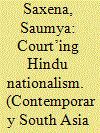

|
|
|
|
|
| Summary/Abstract |
This paper demonstrates the role of the Courts in lending currency to the politics of Hindutva in the 1990s. It focuses on some of the significant and connected cases of the Ayodhya dispute and the infamous Hindutva judgments to illustrate how the court legitimised, perhaps inadvertently, a jingoistic and intolerant ideology as an acceptable political strategy. The rise and electoral successes of the Bharatiya Janata Party (BJP) post-emergency accompanied the party's reliance on the judicial instruments to make its Hindu nationalist ideology palatable to a larger audience and the ‘secular’ citizen. Contrary to the stance of Hindu nationalist organisations against codification of Hindu law and any state interference in matters of religion at the time of independence, in the 1990s the movement relied significantly on judicial instruments for its own legitimacy and for expanding the domain of religion by seeking the patronage of ‘law’. The Court, in what came to be known as the Hindutva judgments, attempted to separate ‘Hindutva’ from ‘Hinduism’, thereby aiding the launch of a new dawn of Hindutva which could then become synonymous with democracy and development. Most significantly, it also opened the doors for electoral promises to be routed through the courts.
|
|
|
|
|
|
|
|
|
|
|
|
|
|
|
|
| 7 |
ID:
132772
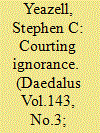

|
|
|
|
|
| Publication |
2014.
|
| Summary/Abstract |
Most of the United States' judicial work takes place in the country's state trial courts. These tribunals preside over everything from traffic tickets to murder trials, from routine debt collection to massive environmental torts. Given their expansive role, the manner in which these courts function is of immense significance. But ultimately, we know very little about these institutions. Our ignorance flows both from trivial bureaucratic turf battles and from deeply rooted principles of local government, a phenomenon I have called "data federalism." In the last few decades, we have begun to form a partial image of the activities of these organs of government; but we know almost nothing about their past, and the little we do know suggests the dangers of extrapolation. This essay explores the extent of our ignorance of state trial courts and the difficulties of overcoming it.
|
|
|
|
|
|
|
|
|
|
|
|
|
|
|
|
| 8 |
ID:
132773
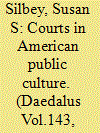

|
|
|
|
|
| Publication |
2014.
|
| Summary/Abstract |
In American public imagination, courts are powerful but also impotent. They are guardians of citizens' rights but also agents of corporate wealth; simultaneously the least dangerous branch and the ultimate arbiters of fairness and justice. After recounting the social science literature on the mixed reception of courts in American public culture, this essay explains how the contradictory embrace of courts and law by Americans is not a weakness or flaw, nor a mark of confusion or naïveté. Rather, Americans' paradoxical interpretations of courts and judges sustain rather than undermine our legal institutions. These opposing accounts are a source of institutional durability and power because they combine the historical and widespread aspirations for the rule of law with a pragmatic recognition of the limits of institutional practice; these sundry accounts balance an appreciation for the discipline of legal reasoning with desires for responsive, humane judgment.
|
|
|
|
|
|
|
|
|
|
|
|
|
|
|
|
| 9 |
ID:
120313
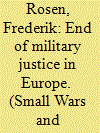

|
|
|
|
|
| Publication |
2013.
|
| Summary/Abstract |
This article suggests an agenda for juridical civil-military relations by considering how recent developments in human rights law in Europe breed new forms of juridical civil-military relations. The argument is that the human right driven recasting of legal authority over military affairs from military justice systems to civilian justice systems entwines these systems. Furthermore, that in so far the theories and studies of civil-military relations have not yet addressed the juridical dimension of civil-military relations as a subject of its own right, this entwining calls for a new subject in the study of civil-military relations, straddling the institutional entwining as well as the sociological dimension of practical cooperation.
|
|
|
|
|
|
|
|
|
|
|
|
|
|
|
|
| 10 |
ID:
117467
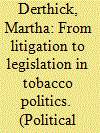

|
|
|
|
|
| Publication |
2012.
|
| Summary/Abstract |
Asks why it was possible for Congress to enact regulation of tobacco manufacture in 2009 after many years of indulging the industry. She finds the explanation in the rise of opposition to the industry in the Democratic Party and the embrace of regulation by Philip Morris, the major manufacturer, which was seeking safety and stability after repeated assaults from an array of public and private actors in legislatures, courts, and the media.
|
|
|
|
|
|
|
|
|
|
|
|
|
|
|
|
| 11 |
ID:
088688
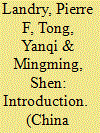

|
|
|
| 12 |
ID:
132775
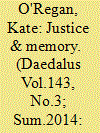

|
|
|
|
|
| Publication |
2014.
|
| Summary/Abstract |
In a society such as South Africa in which the past has been deeply unjust, and in which the law and judges have been central to that injustice, establishing a shared conception of justice is particularly hard. There are four important strands of history and memory that affect the conception of justice in democratic, post-apartheid South Africa. Two of these, the role of law in the implementation of apartheid, and the grant of amnesty to perpetrators of gross human rights violations, are strands of memory that tend to undermine the establishment of a shared expectation of justice through law. Two others, the deeprooted cultural practice of justice in traditional southern African communities, and the use of law in the struggle against apartheid, support an expectation of justice in our new order. Lawyers and judges striving to establish a just new order must be mindful of these strands of memory that speak to the relationship between law and justice.
|
|
|
|
|
|
|
|
|
|
|
|
|
|
|
|
| 13 |
ID:
196042


|
|
|
|
|
| Summary/Abstract |
How do domestic trials addressing wartime violence affect public opinion of government? The legitimation functions of national courts are well studied in liberal democracies, but less is known about the effects of trials that address abuses committed during large-scale conflict. This article investigates how the extent to which such trials achieve procedural justice (fairness in process) and retributive justice (allocation of punishment) affects perceptions of political legitimacy. I provide survey-experimental evidence from post-conflict El Salvador that leverages the repeal of a longstanding amnesty law. Although a trial in general improves citizen evaluations of state competence, fairness and punishment serve crucial – and distinct – legitimation functions. Procedural fairness significantly increased citizens’ willingness to comply with state authorities, regardless of trial outcome. Yet, an unfair trial, when coupled with punishment, bolstered trust in politicians and the judiciary. This suggests a trade-off between public preferences for fairness and an ‘iron fist’ approach to violence. The findings reveal the limits of procedural justice in a post-conflict environment and furnish new insights on the multifaceted functions of human rights trials.
|
|
|
|
|
|
|
|
|
|
|
|
|
|
|
|
| 14 |
ID:
073389
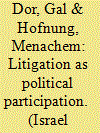

|
|
|
|
|
| Publication |
2006.
|
| Summary/Abstract |
Courts were commonly regarded as a neutral arena to settle disputes between rivals who cannot solve their differences through other means of dispute resolution. In recent years however, greater attention is drawn to the role played by courts within the political process itself. This article sets out to examine the role of public litigation in the Israeli High Court of Justice as a vehicle of political participation. We will argue that the Court has become an avenue for: a) participation in decision-making processes, b) communication with official authorities, and c) protestation against these very same authorities.
|
|
|
|
|
|
|
|
|
|
|
|
|
|
|
|
| 15 |
ID:
114573
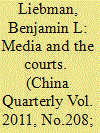

|
|
|
|
|
| Publication |
2012.
|
| Summary/Abstract |
Scholarship on Chinese governance has examined a range of factors that help to explain the resilience of authoritarianism. One understudied aspect of regime resilience and institutionalization has been the growing importance of supervision by a range of party-state entities. Examining court-media relations in China demonstrates that "competitive supervision" is an increasingly important tool for increasing state responsiveness and improving accountability. Court-media relations suggest that China is seeking to develop novel forms of horizontal accountability. Placing such relations in a broader institutional context also helps to explain why common paradigms used to analyse them may be inapplicable in China.
|
|
|
|
|
|
|
|
|
|
|
|
|
|
|
|
| 16 |
ID:
173197
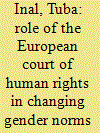

|
|
|
|
|
| Summary/Abstract |
The diffusion of international human rights norms through the enforcement of international human rights law by courts has been explored by both scholars of international relations and international law. Turkey, which has been a state party to most international human rights treaties despite being a major violator of human rights, is the case in this paper. It examines norm diffusion in the area of women’s rights through court action in a patriarchal culture protected and represented by a deeply patriarchal state and judiciary. By looking at the legal processes, domestic and international, through which the issue of the right of Turkish women to keep their maiden names after marriage has gone, this paper argues that norm diffusion through court action can be triggered even in difficult cases such as changing gendered norms and describes the conditions and mechanisms that make these changes more likely.
|
|
|
|
|
|
|
|
|
|
|
|
|
|
|
|
| 17 |
ID:
084216
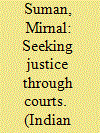

|
|
|
| 18 |
ID:
090984


|
|
|
|
|
| Publication |
2009.
|
| Summary/Abstract |
Specialization in intellectual property law has, in recent years, become an important issue due to the need for an efficient system for the resolution of intellectual property and patent disputes. Specialist courts or panels within existing courts have been developed in many jurisdictions and the question posed in this article is whether New Zealand should follow suit. This article traverses the differing specialist intellectual property (IP) and patent adjudication systems in the United States, United Kingdom, Australia and Japan to assess what system would best suit New Zealand. The benefits and disadvantages of specialization generally are also discussed. The conclusion is that the time is ripe for some form of specialization in IP matters in New Zealand and that the best model for New Zealand to adopt is one similar to that of the Federal Court of Australia panel system, whereby judges opt into particular panels while still taking on cases within the court's general docket. The article proposes that this specialization in New Zealand should occur in the High Court (trial level) as the real need for specialist knowledge is at the fact-finding stage. It is argued that a panel system would strike the appropriate balance between developing expertise on the bench, allowing for cross-fertilization of legal developments, while also preventing stagnation and idiosyncratic interpretations of the law. Some specialization at intermediate appellate court level is also recommended.
|
|
|
|
|
|
|
|
|
|
|
|
|
|
|
|
| 19 |
ID:
176088


|
|
|
|
|
| Summary/Abstract |
The expansive literature on law and justice across Africa emphasizes why people do not use lower state courts. Consequently, a striking lack of attention is paid to how and why people do engage with lower state courts. Drawing on a systematic literature review and a multi-sited qualitative study, we make three contributions on this topic. First, we explore how this academic gap emerged. Second, we critique the procedural justice model that currently underlies much ‘access to justice’ programming, which seeks to improve citizens’ engagements with the courts. In place of what we describe as its arithmetic assumptions about institutional engagement, value, and legitimacy, we propose a trifactor framework. Citizen engagement, we argue, occurs as people reconcile how they think the courts should act, how they expect them to act, and how they need them to act in any given instance. Third, drawing on our empirical studies, we highlight that this framework is flexible enough to capture people’s actually existing decision-making in a wide variety of settings and to map how those trade-offs shift throughout the process of their case, providing important insights into ideas of justice and statehood.
|
|
|
|
|
|
|
|
|
|
|
|
|
|
|
|
| 20 |
ID:
188996


|
|
|
|
|
| Summary/Abstract |
Scholars have found that nonviolent resistance is more effective than violence at promoting post-campaign democratization. We explore whether this relationship extends to judicial systems, specifically. Courts have been shown to be important for promoting and protecting economic development and political rights, yet they have been largely ignored in quantitative studies of post-conflict democratization. We posit that leaders who hold power after domestic unrest will be more inclined to use independent courts as a mechanism to prevent future campaigns–but they do so primarily when fearing a significant mobilization threat and when expecting legal action to be an acceptable channel for dispute resolution by dissidents. As such, we anticipate that levels of judicial independence are higher following nonviolent campaigns as compared to violent conflicts. Using quantitative data from violent and nonviolent campaigns globally, we find that judicial independence is indeed higher in the aftermath of nonviolent, as compared to violent, resistance campaigns. Furthermore, a campaign’s outcome does not matter; post-conflict judicial independence appears to be associated with tactics, not dissident success.
|
|
|
|
|
|
|
|
|
|
|
|
|
|
|
|
|
|
|
|
|